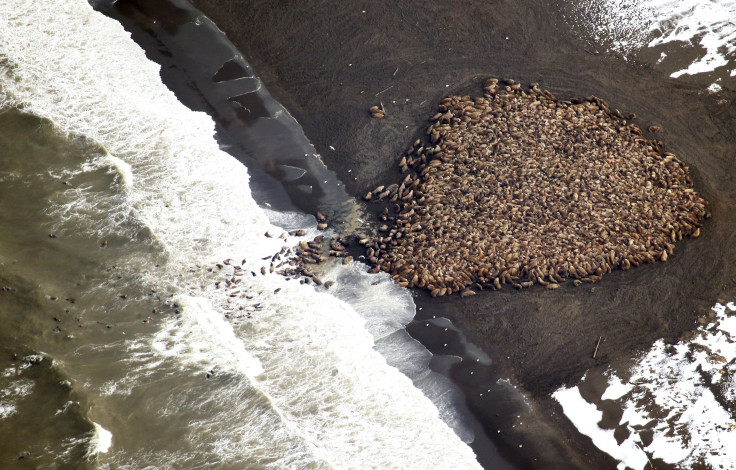Climate Change Skeptics Lash Out At New Global Warming ‘Hiatus’ Study That Questions Ocean Temperature Measurements

A new climate study was released Thursday that refutes the claim that there’s been a slowdown, or “hiatus” in the rate the Earth is warming, but some conservative-leaning media sites skipped covering the study itself and chose instead to promote the views of the minority of climate change deniers, such as Christopher Monckton.
For example, the Drudge Report, an immensely popular headline aggregator operated by conservative Matthew Drudge, prominently displayed the skeptics’ views but chose not to link to other coverage of the study published Thursday by Science magazine and widely reported in the mainstream media.
"It’s not surprising that ideological media outlets would try to pick apart the study," said Aaron Huertas, spokesman for the Union of Concerned Scientists. "On climate -- and other issues, like vaccines and evolution -- there are policies around that science. The criticisms are all coming from people who don’t want climate policy."

The study refutes a claim that the planet’s mean surface-temperature increases began to slow down in 1998, commonly referred to as a global warming “hiatus” phenomenon. Despite an overwhelming consensus among scientists that the Earth is warning at an alarming rate, critics Thursday accused the researchers of consciously cherry-picking facts to mislead the public.
But a team of scientists from the National Oceanic and Atmospheric Administration’s National Centers for Environmental Information and others say the way ocean temperatures have been measured has masked the rate of global warming.
“Adding in the last two years of global surface temperature data and other improvements in the quality of the observed record provide evidence that contradict the notion of a hiatus in recent global warming trends,” Thomas R. Karl, NCEI director, said in a statement on Thursday. "The rate of warming over the first 15 years of this century has, in fact, been as fast or faster than that seen over the last half of the 20th century.”
Updated global surface temperature data do not support global warming “hiatus” http://t.co/7sFutfezgE pic.twitter.com/nj42krvI2I
- NOAA NCEI Climate (@NOAANCEIclimate) June 4, 2015The findings dispute the “hiatus” theory from the Intergovernmental Panel on Climate Change (IPCC), which says observed temperatures rose between 1998 and 2012 at only about a third of the pace of increase between 1951 and 2012.
The the NCEI new report says oceanic temperature measurements have improved greatly in the past two decades, relying more on oceanic buoys instead of manual measurements of sea water. It’s been known for years that ship measurements tend to show cooler water than measurements taken from buoys. The reason could be that the water cools slightly as it is pulled up by bucket to the ship’s deck. Ships also sample a smaller area of the oceans than the automatic measurements of buoys scattered across the world. The NCEI scientists also claim 1998 was an unusually warm year that skews the dataset used by the IPCC, because temperatures dropped in subsequent years from an unusual spike in temperature caused by an extreme El Niño year.

The new study was immediately attacked by skeptics of man-made climate change.
“Scientists with the National Oceanic and Atmospheric Administration released a study Thursday claiming there’s no hiatus in global warming,” wrote Michael Bastasch at the Daily Caller. “But new satellite-derived temperature measurements show there’s been no global warming for 18 years and six months.”
Bastasch, who was lambasted by scientists in February for claiming there’s nothing unusual about Siberia’s rapidly melting permafrost, disputed Thursday’s study just hours after it came out. He accused the scientists of weighing buoy readings over ship readings in an attempt to falsely portray a global warming effect, echoing the views of Bob Tisdale and Anthony Watts, who are oft-cited skeptics of the theory that humans cause significant and damaging global climate changes.
In a post published on the Daily Caller’s site Thursday, Bastasch pointed to British “climate expert” Christopher Monckton to refute NOAA’s research.
Monckton, a well-known global warming skeptic, claims satellite data has shown no measureable increase in global temperatures for the past 18 years, based on Remote Sensing Systems satellite data.
Monckton and his media supporters lend more credence to the RSS readings than those from the ocean’s surface, but a study by Stephen Po-Chedley and colleagues from the University of Washington published in March questioned whether this satellite data should be used to measure long-term temperature changes.
Despite overwhelming consensus in the scientific community, conservative media continue to amplify the voice of skeptics, implying a balanced "debate." The reaction to Thursday’s report was no different.
“Science doesn’t care if you’re conservative or liberal,” said Huertas.
© Copyright IBTimes 2024. All rights reserved.






















